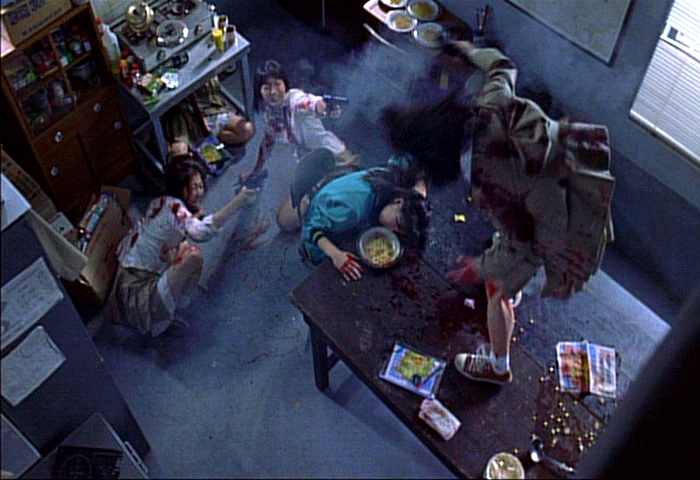 So, you thought your schooldays were tough? We have had cinematic portraits of adults vs. schoolkids before -- Jean Vigo’s Zero for Conduct and Lindsay Anderson’s If… come to mind -- but there has never been a indictment of school-age life quite like Kinji Fukasaku’s Battle Royale. In addition to it being the bloodiest of dramas and blackest of satires, Battle Royale is perhaps the most passionate and crazed cinematic declaration of solidarity with a younger generation ever presented on a movie screen.
So, you thought your schooldays were tough? We have had cinematic portraits of adults vs. schoolkids before -- Jean Vigo’s Zero for Conduct and Lindsay Anderson’s If… come to mind -- but there has never been a indictment of school-age life quite like Kinji Fukasaku’s Battle Royale. In addition to it being the bloodiest of dramas and blackest of satires, Battle Royale is perhaps the most passionate and crazed cinematic declaration of solidarity with a younger generation ever presented on a movie screen.As wildly popular with young audiences as it was threatening to parliamentarians when released in Japan a year ago, Battle Royale plays a limited run this weekend at Toronto’s Cinematheque Ontario. Since it has so far frightened off every North American distributor, it is likely to be confined to the film society/cinematheque circuit for a while longer. But as so often happens, its suppression will likely both add to its cachet and affirm its political stance.
Battle Royale is a fever-pitched exercise in the theory that reality itself is so close to absurdity that you need twist your picture of it only slightly to send it over the edge into nightmarish satire. In this picture, a class of 42 grade-nine students is kidnapped by state authorities, shipped to a deserted island, and thrown into a for-keeps game of Survivor where they must kill each other until there is only one of them left. If more than one student is still alive after three days, every survivor will be killed. Any resemblance between this process and everyday life for a young person in Japan is absolutely intended.
Battle Royale ever-so-slightly stretches the rules of the already tortuous Japanese educational game so that student life now explicitly becomes a matter of life and death. Life on the island is a school day with weapons; where the intercom recites the morning’s body count to the strains of Strauss’s Radetzky March, and an audiovisual presentation is a videotape of a chirpy young Japanese hostess explaining the island’s deadly rules as if she were explaining a game of twister to a band of summer campers.
The schoolyard bully now finds himself in his dream environment, petty schoolgirl’s arguments are settled with guns, and small groups of frightened students huddle together to survive until they’re brutally reminded that the rules of the game rule out any attempts at solidarity. Some respond with denial (“If I survive, I’ll go to a good school” one fantasizes), but more often the response is nihilism. “What’s wrong with killing?” one student argues. “Everybody’s got their reasons!”
This is not exactly an attitude designed to make educators and parliamentarians feel comfortable, and in general, Battle Royale displays a level of cultural self-examination that would be impossible in an American film -- the closest thing to it in recent American cinema is probably Larry Clark’s Bully. Both films are portraits of the near hopelessness of teen life, but in place of Clarks’ unconditional surrender to despair, Battle Royale concludes that defiance in the face of evil is a viable attitude, and that rebellion -- even if hopeless -- is the only sane act for a young person.
It’s probably simply the raw bloody enthusiasm with which the director makes his point that has disturbed officialdom. The 70 year-old Fukasaku made his name in Yakuza pictures thirty years ago, and Battle Royale is presented with an energy that makes John Woo feel like Antonioni, and an operatic passion that would make Martin Scorsese blush. It skates about the edge of exploitation and feels just slightly immoral. But it is also the new milennium’s first great teen movie: It kicks you in the stomach, but it points to a way of survival.
-Published in the Globe and Mail, 2001
